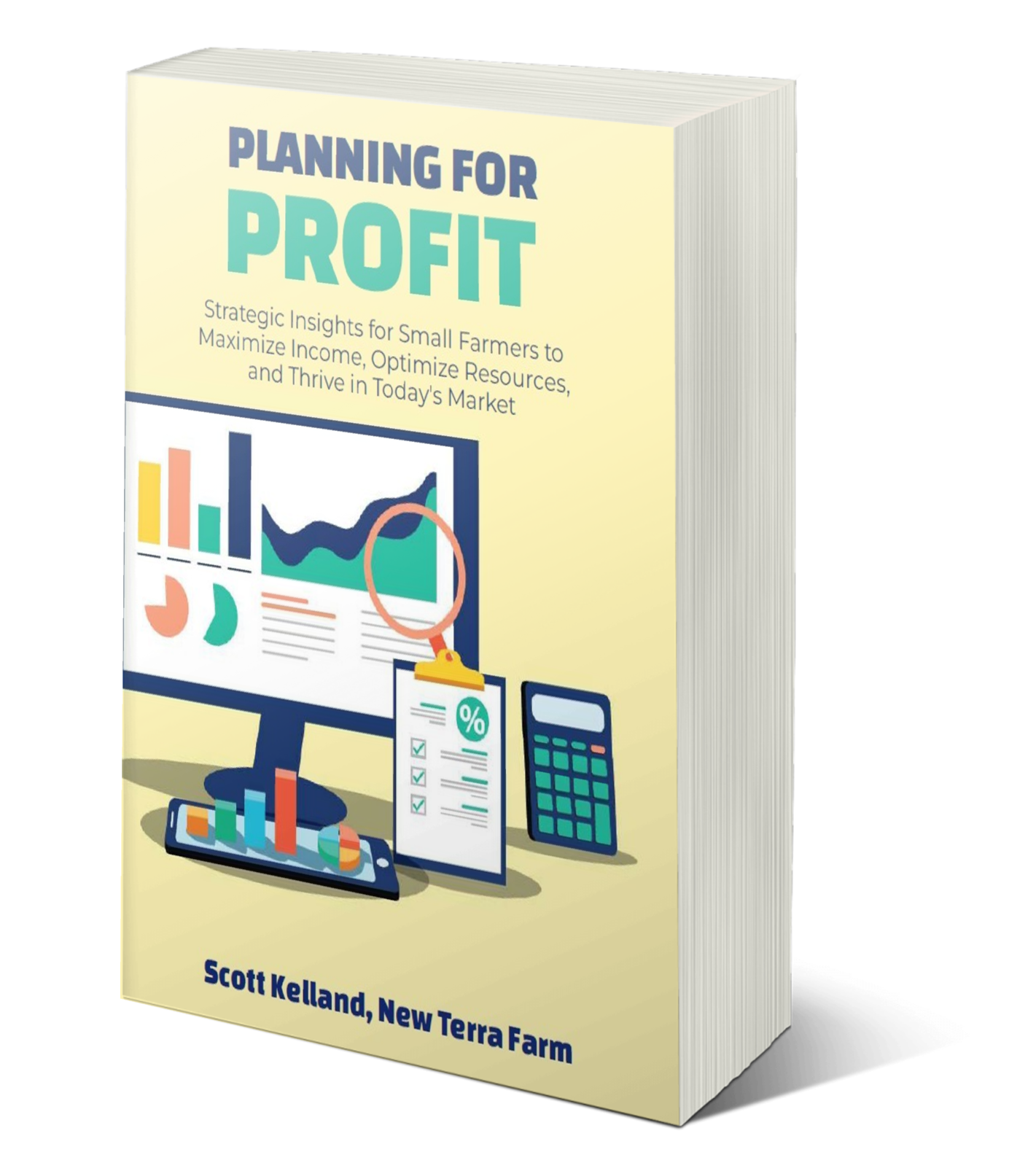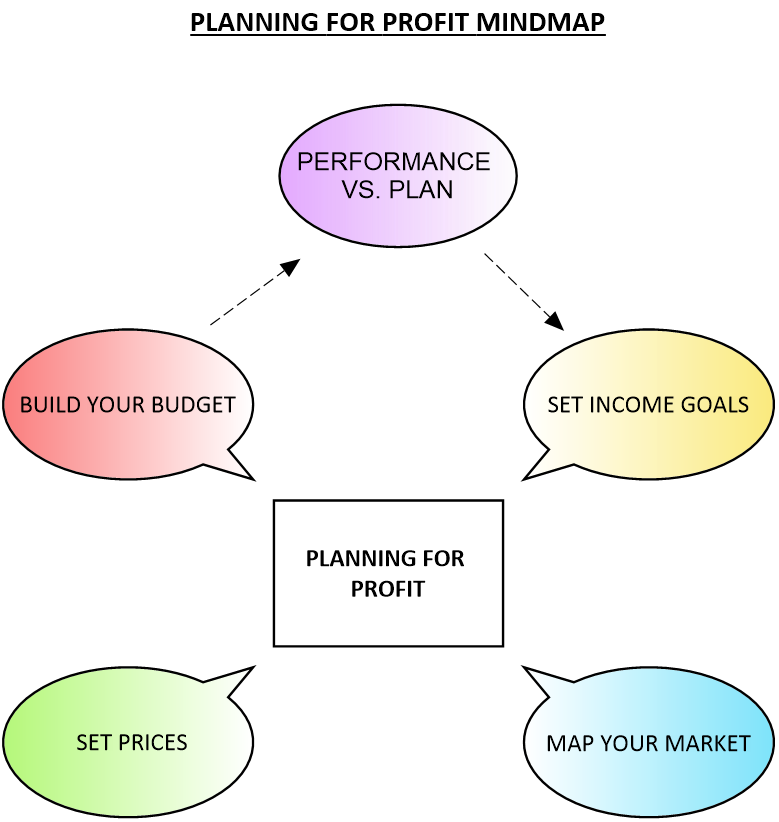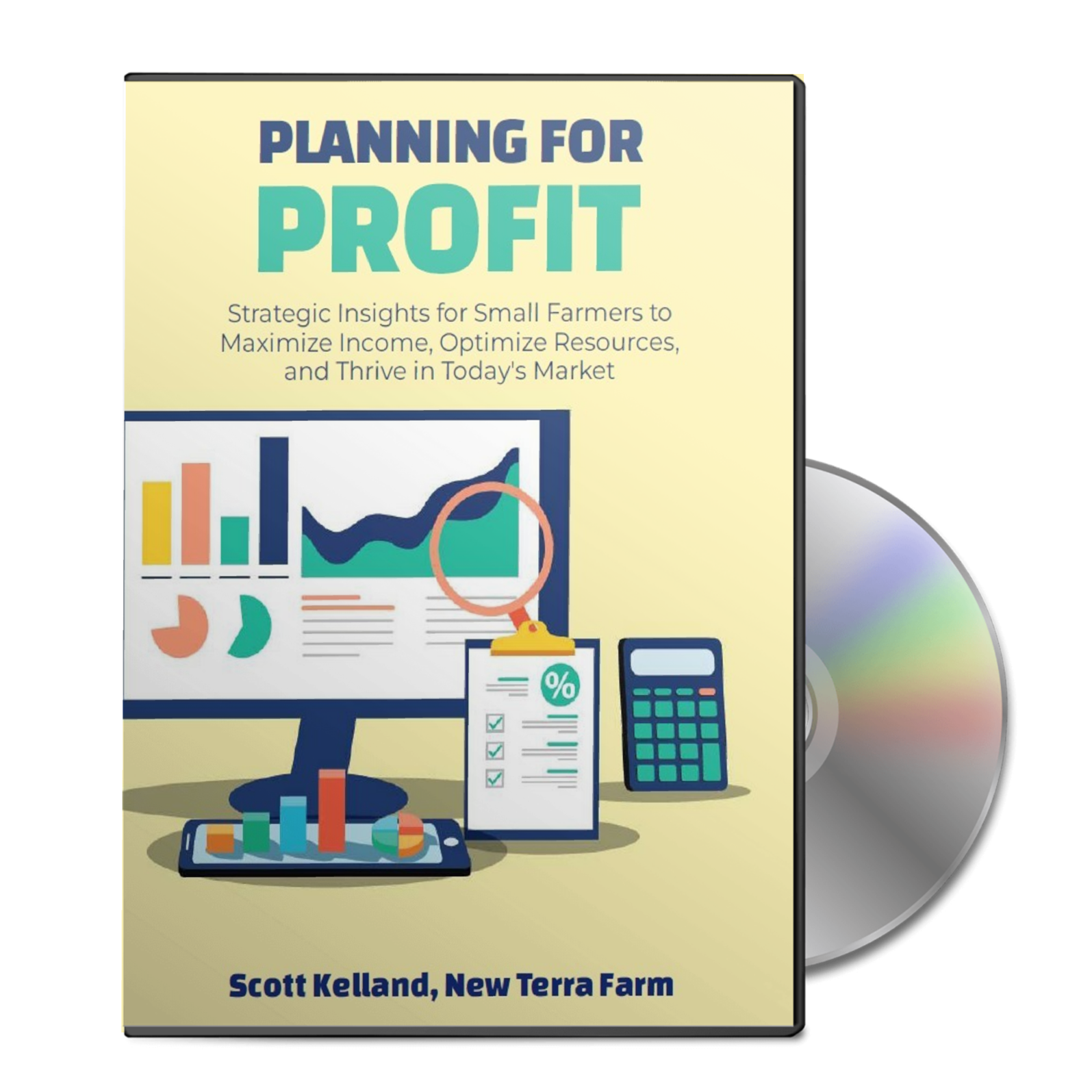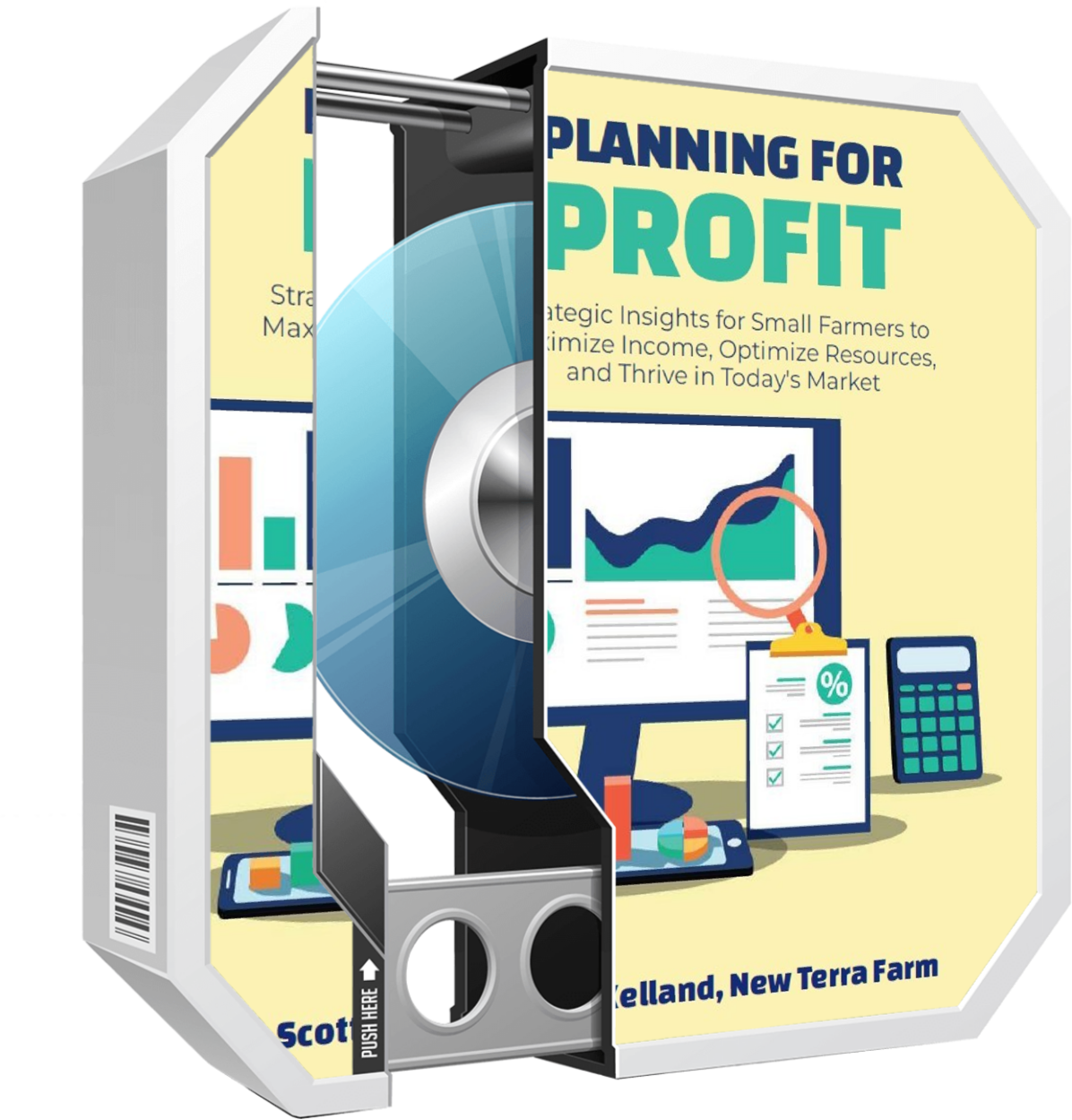Ever Heard The Expression 'Cash Flow Is King'?
Market gardening is the best ‘job’ I ever had. Probably just like you, I get a lot of satisfaction from providing great food to appreciative customers. But there's a catch:
'Satisfaction' doesn't pay the feed bill. Farming is a business. And every business has to make a profit.
With escalating costs and uncertain markets, sometime that's a challenge for the small operator. You need to make sure you have sufficient positive cash flow to run your operations, pay your bills, and carry you though the 'lean times'
There is a solution. Here's the simple truth:
Profit is something you plan for.
Success is never accidental. The guy who started Twitter said that. Success in any business, including farming, is a matter of preparation and planning.
Planning for profit means:
- You set goals for sales and income,
- You map those goals to the customers you want to serve
- You present those customers with a fair price for your product
- You measure and track your results against your plan
Does that sound like a lot of work? Here's another quote for you:
"Spectacular achievement is always preceded by unspectacular preparation ".
- Robert H. Schuller
If you want to make more money on your farm, you have to plan and prepare for that result.
Besides, you didn't become a farmer because you were afraid of a little hard work.
And, I can help.
If Your Income Is Falling Short Of Expectations, You Might Need This

When I worked as a consultant in business performance improvement, one of my maxims was “You can’t manage a process unless you understand it. And you can’t understand it unless you:
1. Plan For the results you want; and,
2. Measure results compared to the plan.
What does this have to do with small farm profits?
Small farm owners need to understand the financial implications of their decisions. This enables them to make informed choices. I call this ‘financial literacy’.
Financial literacy means you can manage cash flows, track expenses, and make strategic investments. You can understand profit and loss dynamics, contributing to long-term sustainability and growth.
You comprehend financial terms such as net and gross income, markup, and margin. Understanding these terms is essential for ensuring your farm's financial health.
And you can stay in compliance with tax regulations, avoiding penalties and audits.
In short, financial literacy is vital in understanding the financial challenges of starting a farm and developing a plan to deal with them.
This course is the fast path to achieving that critical knowledge.
Don't Leave Money On The Table
If you are not Planning for Profit you are leaving money on the table.
Planning for profit is a process of building a financial plan that helps your business anticipate revenues, expenses, and profit over a specific period. It involves setting goals, forecasting income, and controlling costs to achieve your desired sales goals and profit margins.
Farms of just about any size can be profitable; it's a matter of applying some basic economic analysis and planning to design an operation that makes sense (and profits).
Want to see more?

 If you are not planning for profit, what are you planning for?
If you are not planning for profit, what are you planning for?"Planning for Profit" is a comprehensive course crafted by a small farmer to empower farmers with essential tools and knowledge to maximize their returns.
My course is structured into three components—a guidebook, interactive worksheets, and user-friendly spreadsheets—each designed to provide a clear path to financial stability and prosperity.
This is critical knowledge for the small grower operating in today's complex agricultural marketplace.
Here's a sample of what you will learn:
- Revenue Forecasting: Estimating future sales based on historical data, market analysis, and industry trends.
- Cost Management: Identifying and controlling business expenses, including fixed and variable costs.
- Budgeting: Creating a detailed financial plan that allocates resources and sets limits on spending.
- Profit Margin Analysis: Calculating profit margins to understand the relationship between revenue, costs, and profit.
How Can I Enroll In 'Planning For Profit'?
'Planning For Profit' is a self-paced course you can complete in your own home on your own time. Here's what you get when you enroll:
1. Planning for Profit Guidebook:
The guidebook serves as the foundation of this course, offering a detailed explanation of essential concepts and strategies for planning for profit. It covers topics such as financial management, budgeting, cost analysis, pricing strategies, and market research.
2. Printable Worksheets:
The four worksheets serve as interactive tools that allow farmers to apply the principles learned through practical exercises. By completing these exercises, farmers can evaluate their current financial situation, calculate costs and profits, and make projections for future growth.
3. Custom Spreadsheets:
The three user-friendly spreadsheets incorporate formulas that enable farmers to perform complex calculations easily. They cover key areas such as budgeting, cash flow analysis, and pricing strategies. By utilizing these spreadsheets, farmers can save valuable time and accurately track their financial performance.
OK, But I Have Questions...
If you are thinking about this course seriously, I’m sure that questions are popping up in your mind right about now.
Q: Is this course suitable for beginners?
A: Absolutely! "Planning for Profit" is designed for farmers at all experience levels. Whether you're just starting out or looking to improve your existing operations, you'll find valuable insights and practical tools in this course..
Q: How long does it take to complete the course?
A: The course is self-paced, allowing you to work through the guidebook, worksheets, and spreadsheets at your own speed. Most farmers complete the course within a few weeks, but you can take as long as you need!
Q.
Do I need any prior knowledge of finance or accounting to take this course
?
A. The Guidebook, Worksheets and Custom Spreadsheets come with complete instructions and examples of their use. We start by explaining and defining the financial terms used in the course, with easy-to-follow examples. You don't need a background in finance to complete this course
More Than 2,000 People Have Bought My Books And Courses To Help Them ACHIEVE Their Small Farm Dreams. Here's What Some Of Them Had To Say...
"Great workshop series. Scott provided a lot of great insights and information which will guide us on our expansion plans".
= Ben L., cash crop farmer looking to expand
"My partner and I learned more about the practical business of farming from your course than from a local business coach we hired".
- Market Farming couple, California USA
"The info you are teaching is pure gold. I am loving the presentation and I am working through the workbook materials every chance I get".
- Michael Graham, Owner
Georgian Bay Aquaponics
"Fantastic reading, and it'll be really helpful when we start up our farm!
- Katie W.
"Very
well written. It seems that you have that gift of being able to
transpose your thoughts onto paper with ease and simplicity"
- Stephen W.
My 'One Farmer To Another' Guarantee:
Try 'Planning for Profit' RISK-FREE

I want you to have all the time you need to read and USE my 'Planning For Profit' course.
That's why I'm going to give you a full 12 months to decide if this is for you.
If for any reason, or no reason at all, you are not 100% satisfied simply send me an email, scott@new-terra-natural-food.com and I'll refund every penny of your investment . . .No questions asked!
Over more than a decade and more than 2,000 sales, I've been asked for a refund exactly twice. Which I promptly and happily issued. So I am pretty confident you will find a lot of value here.
What's Unique About 'Planning For Profit'?
This course was built by me based on more than 20 years' experience as an award-winning organic farmer and a business consultant specializing in business planning and improvement. This course brings together what I've learned and practiced in both those fields over the last couple decades.
The guidebook, worksheets and custom spreadsheets are designed specifically for small farmers.
I show you, step-by-step how to set financial goals and then achieve those goals in a strategic and systematic way
You just can't get these valuable resources anywhere else!
Enroll In 'Planning For Profit'

It's The Right Time To Plan For Your Most Profitable Season Ever
 There's a bundle of valuable resources inside
There's a bundle of valuable resources insideRemember that quote, 'Spectacular achievement is always preceded by unspectacular preparation'.
Don't miss this opportunity to plan and prepare for your best season ever.
An investment in knowledge pays the best returns. I'm pretty confident your investment in this course will pay you back many times over - provided you bring your brains and motivation to the task and do the work.
When you buy my course securely using PayPal or your credit card, you will receive a download link to get the course material. No physical book will be shipped, so no waiting to get started!
Whether you're a complete beginner or an experienced farmer looking to take your business to the next level, 'Planning For Profit ' is your guide to planning a successful and sustainable business.
Click on 'Add to Cart' to get started.